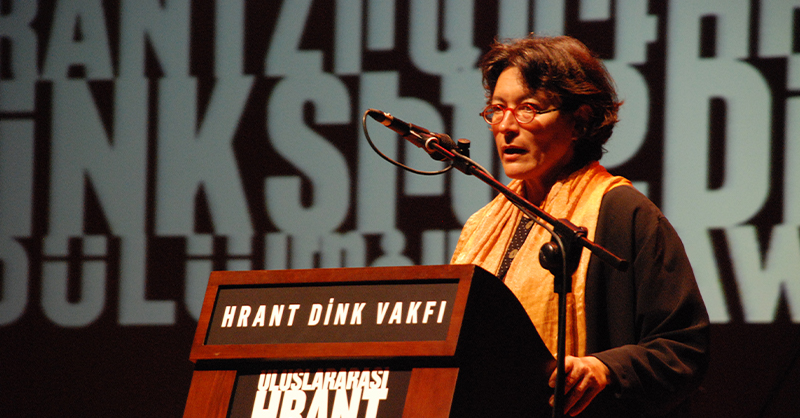
AMIRA HASS was born in Jerusalem in 1956. She was raised as the only child in a home of two Holocaust survivors and communist activists from Yugoslavia (mother) and Romania (father) who until their death fully supported her way. When asked, she says that she did not come from a mainstream family, that is to say, there was nothing strange or rebellious or daring in moving to live with Palestinians or to write against the Israeli policies.
After failed attempts to continue her History studies at the university, in 1989, she started working at Haaretz, an Israeli daily newspaper. She first worked as a copy editor, and gradually as a reporter. Since the end of 1993, she covered Palestinian occupied territories. By the end of 1993, she moved to live in Gaza and in 1997, in Ramallah, the West Bank, where she lives until today.
She published one original book “Drinking the Sea at Gaza: Days and Nights in a Land Under Siege” (USA, 2000, published by Henry Holt), which was translated in several languages. She also published two collections of articles: “Reporting from Ramallah” (2003, semiotext; in English and other languages), which is a collection of Haaretz articles from 1997 to 2002 and “Domani Andra Peggio” (Tomorrow Will Be Worse; in Italian and German), based on the columns she wrote for the Italian weekly magazine Internazionale.
When asked Hass says that she is not an expert of “the Palestinians” as it needs a lot in order to know an entire people, but she is of the Israeli Occupation. Hass focused more than any other journalist –be it Israeli, Palestinian or foreigner– on the Israeli sui generis system of travel restrictions. She still hopes to complete a book on the development of the Pass System, which deprives Palestinians of their freedom of movement.
Her mother wrote a diary in Bergen-Belsen concentration camp. This diary that had been published in the past in several languages recently was published again by a left-wing publishing house in the US –Haymarket Books. Two essays which Hass wrote about her mother’s and father’s life are included in the book along with a historical essay by a young Jewish-Yugoslavian scholar, Emil Kerenji.

It is difficult to thank you for this gift and encouragement you are offering me today because it is the result of Hrant’s murder. True, we are celebrating today Hrant’s birthday and existence, presence, but it would not have been celebrated in such a manner, had he not been murdered.
But even if I met with you and Hrant in other - easier circumstances - the same sense of permanent sadness and grief that I feel today – would have anyway connected us. It is the permanent sadness that is felt by people like myself - children of the generation who survived the German Industry of Murder. Sadness that never leaves us - the same sadness that never leaves Armenians.
Another feeling that unites me with the audience here is anger - the anger with what our governments and authorities are causing to another People.
sadness and anger are hard to be described in words. A strange thing for me - a journalist - to say.
The words that I do use, though, do not put me in the least of the dangers that - so I have discovered in the past 24 hours - are facing journalists in Turkey. We in Israel do not have 301, we can publish very harsh criticism of official policies and do not face imprisonment or lawsuits - not to mention outright murder. Today, the UN report on the Gaza onslaught was published: it determines Israel has committed war crimes and probably crimes against humanity. “This could not surprise anyone who has read your reports”, I was just told by someone at my paper. But many have chosen not to read my reports, or to disregard them.
So, the challenge we, Israeli journalists who monitor the Israeli regime of Occupation, face is of different nature: that of not being heard or listened at.
It’s not for vanity sake that we want to be heard - but because there is always the hope that awareness of the cruel details and the dangerous policies of domination might help prevent a future catastrophe.
